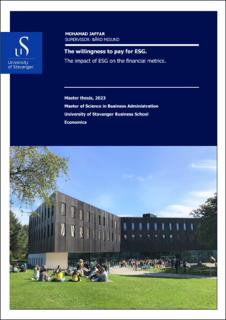The willingness to pay for ESG. The impact of ESG on the financial metrics.
Master thesis
Permanent lenke
https://hdl.handle.net/11250/3089872Utgivelsesdato
2023Metadata
Vis full innførselSamlinger
- Studentoppgaver (Business) [1035]
Sammendrag
To what extent are investors and companies in the Nordic countries inclined to invest inenvironmental, social, and corporate governance (ESG) practices and consider other relatedfactors? This paper examines the economic effect of ESG factors on the financial metrics of343 Nordic companies over the period 2013-2022. The ESG ratings were obtained from theThomson Reuters Refinitiv (2023) database, and Ordinary Least Squares (OLS) regressionanalysis was used to assess the relationship between ESG factors and financial metrics suchas return on equity (ROE), weighted average cost of capital (WACC), Beta, and price-book-value P/B. The findings suggest that the overall ESG combined rating does not exhibit asignificant relationship with these financial metrics. The findings emphasize the intricatenature of the relationship between ESG factors and financial performance. Although ESGfactors do not have a strong impact on ROE and P/B, they do exhibit significant relationshipswith Beta and WACC. This suggests that ESG considerations may play a more prominentrole in determining a company's risk profile and cost of capital, compared to their directimpact on profitability and valuation metrics. However, the analysis reveals mixed resultsregarding the influence of specific ESG factors. Human rights have a positive effect on ROEand P/B, while CSR has a negative effect on both. This suggests that different ESG factorscan have contrasting effects on financial performance. Variables related to environment,social, human rights, and innovation show no significant association with financial metrics.Workforce and CSR have a negative impact on WACC, indicating potential cost savings forcompanies prioritizing these factors, whereas governance has a positive impact on WACC,reflecting higher return expectations for firms with strong governance practices.
